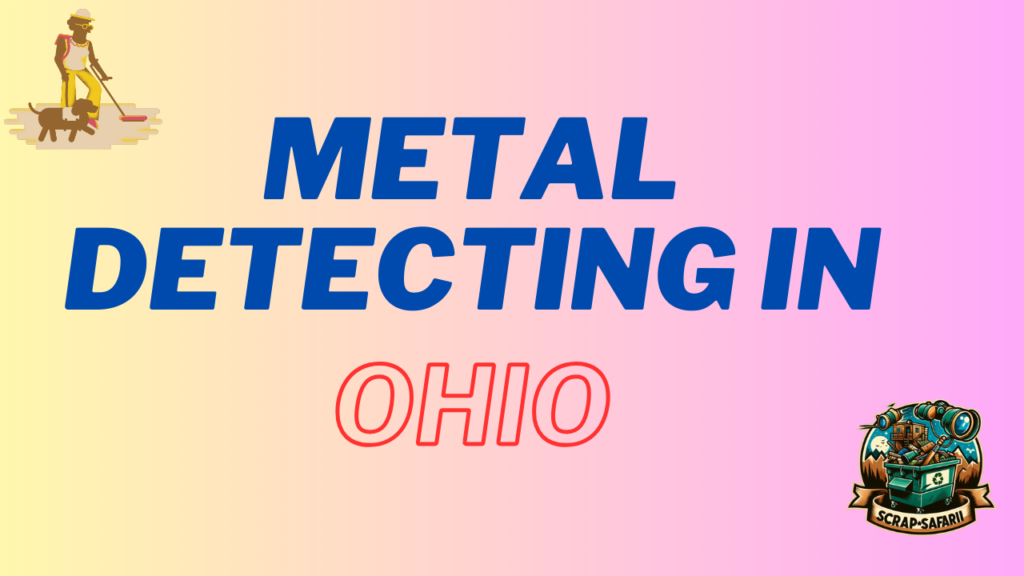Metal detecting has been a popular hobby in Ohio for decades, drawing residents and visitors alike to explore the state’s rich history buried just beneath the surface. From ancient Native American artifacts to remnants of early settlements and even lost treasures from the 1800s, the diverse landscapes of Ohio offer an exciting array of potential finds for detectorists.
While metal detecting in Ohio is legal, there are important regulations in place to protect both archaeological sites and private property rights. Responsible detectorists must obtain proper permits when searching on state-owned lands and always get explicit permission before detecting on private property. Following ethical practices is crucial to preserving Ohio’s heritage while ensuring this rewarding hobby can be enjoyed for generations to come.
As metal detecting continues growing in popularity, it’s essential for hobbyists to prioritize responsible stewardship of Ohio’s historical resources. By learning about applicable laws, respecting cultural artifacts, and minimizing environmental impact, detectorists can uncover fascinating glimpses into the past while setting an example of how to legally and ethically pursue this unique activity.
Is Metal Detecting in Ohio Legal?
Metal detecting is legal in Ohio, but there are important regulations to follow depending on whether you are searching on public or private lands.
Public Lands
On most public lands in Ohio, including state parks, beaches, and recreational areas, you are allowed to metal detect with some restrictions:
- You must obtain a permit or written permission from the agency managing the land. Permit fees are typically $5-25 per year.
- Digging is prohibited in many areas to prevent damage and preserve natural/cultural resources. You can only collect surface finds.
- You must stay within designated “searchable” areas and avoid historical sites, construction zones, or ecologically sensitive locations.
- Removing artifacts or objects of archaeological/historical significance is illegal without proper permits and oversight.
It’s crucial to check the specific regulations for each park or public space, as the rules can vary. Some city and county parks may prohibit metal detecting entirely.
Private Property
To metal detect on any private property in Ohio that you do not own, you must obtain explicit written permission from the landowner beforehand. This includes:
- Residential yards and farmlands
- Privately owned woods or undeveloped areas
- Abandoned home sites or ghost towns on private lands
Never metal detect on private lands without securing advance permission, as doing so could constitute trespassing. When requesting permission, do so politely and be transparent about your intentions.
Best Public Areas for Metal Detecting in Ohio
Ohio offers a variety of excellent public lands for metal detecting, from scenic state parks and beaches to historic ghost towns and parks within cities and counties. However, it’s crucial to understand and follow the specific regulations for each area.
State Parks and Beaches
Many of Ohio’s state parks and beaches along Lake Erie and the Ohio River allow metal detecting, but you’ll need to obtain a permit first. The requirements and fees for these permits vary from park to park, so be sure to check with the specific location before you go. Additionally, most state parks prohibit any digging or disturbing of the ground, so you’ll need to limit your detecting to areas with exposed soil or sand.
City and County Parks
Rules for metal detecting in city and county parks can vary widely. Some parks issue free permits allowing metal detecting in designated areas, while others completely prohibit the activity. Many local parks also have strict rules against digging or disturbing the ground. Before heading out, contact the park office to understand their specific regulations.
Ghost Towns and Historic Sites
Ohio’s rich history offers opportunities for uncovering fascinating relics with your metal detector. Abandoned ghost towns and other historic sites can yield coins, jewelry, and artifacts from years gone by. However, be mindful that many of these locations are on private property, so you’ll need explicit permission from the landowner before searching. Additionally, take care not to damage or remove any historically significant items you may find.
No matter where you metal detect in Ohio, always respect the land, follow all regulations, and obtain any necessary permits. With responsible practices, you can enjoy this rewarding hobby while preserving Ohio’s natural and historical treasures.
Getting Permission for Private Property
While many public lands in Ohio allow metal detecting with proper permits, some of the best potential sites are on private property. Always get explicit permission from the landowner before metal detecting on any private land.
When requesting access, be polite and explain that you will only be using a metal detector to find lost coins, jewelry, and relics. Reassure the owner you will carefully fill any holes made while recovering finds. Offer to share a portion of your discoveries as a gesture of goodwill.
Many landowners may be open to allowing metal detecting if they understand the benefits. Point out that you will be cleaning up old metal objects from their property at no cost to them. The landowner may even get to keep or share in any valuable finds.
Here is a sample permission request letter:
Dear [Landowner name],
My name is [Your name] and I am an amateur metal detectorist exploring the history of our area. I am writing to request your permission to metal detect on your property located at [address].
I will be using a metal detector to locate lost coins, jewelry, and relics buried inches below the surface. Upon finding any objects, I will carefully refill any holes dug. My goal is to discover and preserve pieces of the past while ensuring no damage is done to your land.
As a token of appreciation, I would be happy to share a portion of any valuable finds or historical artifacts recovered. You may also be interested in keeping certain items yourself as a connection to your property’s history.
Metal detecting is a fascinating hobby that allows us to uncover the past. It will be conducted with the utmost respect for your property rights. Please let me know if you would consider granting me permission to responsibly pursue this educational activity on your land.
Thank you for your consideration.
Sincerely,
[Your name]
By respectfully explaining your intentions and the benefits, many landowners will be willing to grant metal detecting access. Always be sure to follow any conditions they set and leave the property just as you found it.
Metal Detecting Ethics and Safety Tips
When metal detecting in Ohio, it’s crucial to prioritize safety and ethical practices to ensure the preservation of historical sites and artifacts, as well as respect for private property. Proper research and preparation can make your metal detecting experience both rewarding and responsible.
Before venturing out, take the time to research the history of the area you plan to explore. This knowledge can help you identify and avoid disturbing any potentially significant archaeological sites or Native American artifacts. If you do happen to uncover artifacts of historical importance, leave them in place and promptly notify the appropriate authorities.
Respecting archaeological artifacts is not only a legal requirement but also a matter of preserving our shared cultural heritage. Removing or damaging these artifacts can result in the loss of valuable historical information and context. Always exercise caution and seek guidance from experts if you’re unsure about the significance of your finds.
When metal detecting, it’s essential to follow the principle of “leave no trace.” This means filling in any holes you dig and restoring the area to its original condition. Not only does this demonstrate respect for the land, but it also helps prevent potential hazards for others who may use the area.
Be aware of potential hazards specific to the site you’re exploring. These can include steep slopes, unstable ground, or even the possibility of encountering wildlife. Proper safety gear, such as sturdy boots, gloves, and a first-aid kit, can help mitigate risks and ensure your well-being.
Finally, remember to practice good metal detecting etiquette. Respect private property boundaries, obtain necessary permissions, and be mindful of other people using the area. Avoid causing disruptions or leaving behind litter, and always be courteous to landowners and fellow hobbyists.
By adhering to these safety and ethical guidelines, you can enjoy the thrill of metal detecting while contributing to the preservation of Ohio’s rich history and natural landscapes.
Conclusion
Metal detecting in Ohio offers a unique opportunity to uncover fascinating glimpses into the state’s rich history. From ancient Native American artifacts to remnants of early settlements and lost treasures, the diverse landscapes of Ohio provide ample potential for exciting finds.
However, as this popular hobby continues to grow, it is essential for detectorists to prioritize responsible stewardship of Ohio’s historical resources. By understanding and following the applicable laws and regulations, respecting cultural artifacts, and minimizing environmental impact, metal detecting enthusiasts can legally and ethically pursue this rewarding activity.
Whether exploring public lands or securing permission to search private properties, metal detectorists in Ohio must remain vigilant in their practices. Prioritizing safety, ethics, and preservation will ensure that the thrill of discovery can be enjoyed for generations to come, while safeguarding Ohio’s irreplaceable historical and cultural heritage.
With diligence and a commitment to responsible practices, metal detecting can continue to provide fascinating glimpses into Ohio’s past, allowing residents and visitors alike to uncover the state’s rich stories buried just beneath the surface.

Meet Emily, our passionate metal detectorist and history enthusiast. With her trusty Manticore and Deus 2 metal detectors by her side, she delves deep into the earth, unearthing hidden treasures and untold stories from the past. Through her adventures documented on Instagram and YouTube, Emily invites you to join her on a journey of discovery, where every find tells a tale. Whether it’s ancient artifacts or forgotten relics, she’s dedicated to sharing the excitement and wonder of the world beneath our feet. Follow along with Emily on her quest to uncover the secrets of history at scrapsafari.com.


